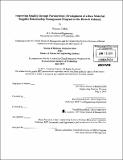| dc.contributor.advisor | David Simchi-Levi and Donald Rosenfield. | en_US |
| dc.contributor.author | Cadena, Noramay J., 1981- | en_US |
| dc.contributor.other | Leaders for Global Operations Program. | en_US |
| dc.date.accessioned | 2011-09-27T18:38:23Z | |
| dc.date.available | 2011-09-27T18:38:23Z | |
| dc.date.copyright | 2011 | en_US |
| dc.date.issued | 2011 | en_US |
| dc.identifier.uri | http://hdl.handle.net/1721.1/66062 | |
| dc.description | Thesis (M.B.A.)--Massachusetts Institute of Technology, Sloan School of Management; and, (S.M.)--Massachusetts Institute of Technology, Engineering Systems Division; in conjunction with the Leaders for Global Operations Program at MIT, 2011. | en_US |
| dc.description | Cataloged from PDF version of thesis. | en_US |
| dc.description | Includes bibliographical references (p. 74-75). | en_US |
| dc.description.abstract | In biotechnology, much focus is put on the science behind proteins and cells; less attention has traditionally gone to the raw materials used to produce medicines. However, in the recent past, internal and external drivers have prompted a change in the way biotechnology companies manage raw material suppliers - the old focus was primarily around quality, cost and lead time; an additional focus is now around reliability and consistency. Suppliers are an integral part of the supply chain for a biotechnology company. To be successful and competitive, biotechnology companies must work effectively with suppliers to understand raw material origins, compositions, interactions with processes and machinery, and to understand the causes of variability and quality defects. Such a partnership or collaborative approach can be executed under a robust supplier relationship management program. This research study analyzes the early stages of a supplier relationship management program at a biotechnology company - it reviews the program and the results of two pilot activities with suppliers and combines that data with benchmarking and academic work to generate recommendations for improving the program and general recommendations around working collaboratively with raw material suppliers. The findings of the research study include recommendations spanning a large breadth of activities including company culture, team formation and training, supplier selection, timeliness and project management. Notably, the power of positive and proactive relationships was a tangible outcome of the pilot projects and that yields promise in the ability to improve quality and reduce variability through partnerships and collaborations with raw material suppliers. | en_US |
| dc.description.statementofresponsibility | by Noramay Cadena. | en_US |
| dc.format.extent | 75 p. | en_US |
| dc.language.iso | eng | en_US |
| dc.publisher | Massachusetts Institute of Technology | en_US |
| dc.rights | M.I.T. theses are protected by
copyright. They may be viewed from this source for any purpose, but
reproduction or distribution in any format is prohibited without written
permission. See provided URL for inquiries about permission. | en_US |
| dc.rights.uri | http://dspace.mit.edu/handle/1721.1/7582 | en_US |
| dc.subject | Sloan School of Management. | en_US |
| dc.subject | Engineering Systems Division. | en_US |
| dc.subject | Leaders for Global Operations Program. | en_US |
| dc.title | Improving quality through partnerships : development of a raw material supplier relationship management program in the biotech industry | en_US |
| dc.type | Thesis | en_US |
| dc.description.degree | S.M. | en_US |
| dc.description.degree | M.B.A. | en_US |
| dc.contributor.department | Leaders for Global Operations Program at MIT | en_US |
| dc.contributor.department | Massachusetts Institute of Technology. Engineering Systems Division | |
| dc.contributor.department | Sloan School of Management | |
| dc.identifier.oclc | 753703550 | en_US |
